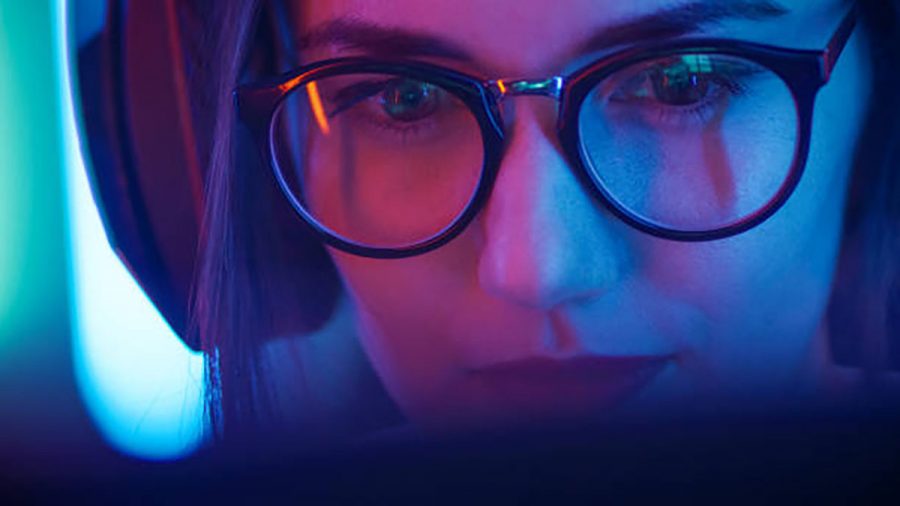The Truth about Blue Light
Why investing in blue-light filtering glasses wouldn’t be a bad idea
Photo by SUBMITTED
Cumulative exposure to the HEV blue light can cause long-term damage to the eyes.
A few weeks ago, I went to the eye doctor to get my annual eye exam. After getting my eyes checked, I had to get a different prescription and new glasses.
I have been wearing glasses for about two years now, but at this appointment, my optometrist also offered a blue-light option with my prescribed lens, so I decided to get those as well.
After wearing my glasses with the new blue-light lens for a few weeks now, I have already noticed a significant difference in how my eyes feel after staring at my computer screen for hours on end.
As students, we expose ourselves to blue-light daily and for extended periods of time. Because of this, I thought I’d do some research on the topic to educate others about the negative effects of blue light and why everyone should invest in a pair of blue light lenses.
Here is what I’ve come across.
Anterior structures of the adult human eye are very effective at blocking UV rays from reaching the light-sensitive retina at the back of the eyeball. But, according to Eyesafe’s website — a website developed in collaboration with world-leading eye doctors and scientists — researchers have found that HEV blue light passes through the cornea and lens and then reaches the retina at the back of the eye. Thus, over time, cumulative exposure to the HEV blue light can cause long-term damage to your eyes.
Damage to retina cells, long-term vision problems, suppressed production of the natural release of melatonin and digital eye strain are all effects of exposure to blue light.
The symptoms of digital eye strain include dry eyes, blurry vision and headaches. Many of these visual symptoms are temporary and will decline after you get off your device, however, individuals might experience continued reduced visual abilities, like blurred distance vision.
If nothing is done to address the cause of the problem, the symptoms will continue to recur and perhaps worsen with future digital screen use.
In Harvard Medical School’s research article, “Screen time and the Brain”, the author, Debra Rude, a writer, editor and communications professional, states that people who stay up late texting are not only getting less shut-eye, but they’re also lacking the deep REM sleep essential to pocess and store information from that day into memory.
Michael Rich, director of the Center on Media and Child Health at Boston Children’s Hospital and associate professor of pediatrics at Harvard Medical School, talks about this idea in regards to teenagers.
“So even if they stay awake in algebra class, they may not remember what happened in class yesterday,” Rich said.
Blue-light filtering glasses are only one way to combat all of the negative effects and symptoms that come with excessive screen time and blue light emissions. These yellow-tinted lens lenses filter out blue light by blocking the transmission of a specific range of wavelengths.
On the American Academy of Ophthalmology’s website, Dr. Sheri Rowen, of the Eyesafe Vision Health Advisory Board, said “the lenses are designed to help reduce the occurrence of digital eye strain and avoid circadian rhythm cycle disruption, affecting sleep and overall well-being.”
I am doing myself a favor by protecting my eyes in the long run and I advise everyone who wears glasses to propose the question to their optometrist about implementing the blue-light lens into their current prescription, or, if you don’t wear glasses on the daily, investing in a pair of blue-light glasses wouldn’t be a bad idea.
You only have one pair of eyes and should take care of them. You can be stylish while studying and avoid the negative effects blue-light causes.
Erickson can be reached at ericksjk7056@uwec.edu.

Jenna Erickson is a first-year integrated strategic communications and Spanish student. This is her second semester on The Spectator. Jenna loves coffee, singing and playing the marimba.


